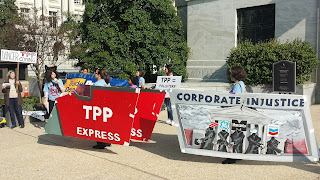As part of the Trafficking in Persons (TIP) document, the U.S. upgraded the standing of Malaysia despite concerns raised by human rights activists here and abroad about the nation's forced labor practices. Its new ranking would allow it to participate in the Trans-Pacific Partnership (TPP), which is currently being discussed in Hawaii.
Teamsters General President Jim Hoffa said the welfare of workers must be considered before any trade agreement:
While negotiators are trying to finish up discussions on the TPP this week, America should not lose focus on what is truly important. Malaysia must come into compliance with international labor standards that ban forced labor before it is allowed to participate in this Pacific Rim trade agreement. Our standing in the world demands the U.S. to take such a position for those being exploited around the world.
This is just the latest, of course, in a litany of potential problems involving the 12-nation Pacific Rim trade deal. This agreement will ship thousands of jobs overseas, weaken labor standards (as the Malaysia action shows), and allow unsafe food and products to flood American shores. It will also balloon the U.S. trade deficit by doing nothing to curtail currency manipulation by other countries, which will lower the price of imported goods into the U.S. while raising the price of products we export.
There are many hurdles that still need to be worked out as part of TPP. Nations have a litany of concerns, as Politico points out, that trade leaders need to solve going forward:
Canada wants to protect its dairy and poultry producers and Japan, its rice farmers. American drug companies want other countries to adopt strong U.S. protections on a blockbuster new class of medicines called biologics, and U.S. automakers oppose giving Japan more market access. Canada and Malaysia are particular concerns because of difficult domestic politics that could make it more difficult for them to close in Maui, even if other countries are ready.
At the end of the day, the Teamsters' concerns about Malaysia and trade are the same -- people need to count more than corporations. Elected officials need to remember that too.

